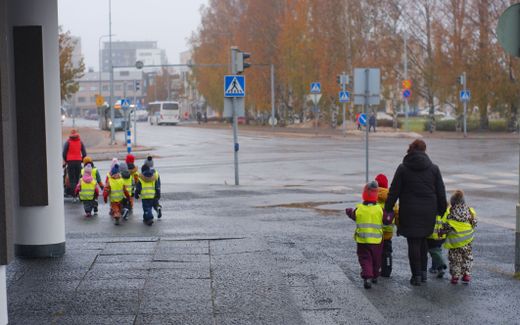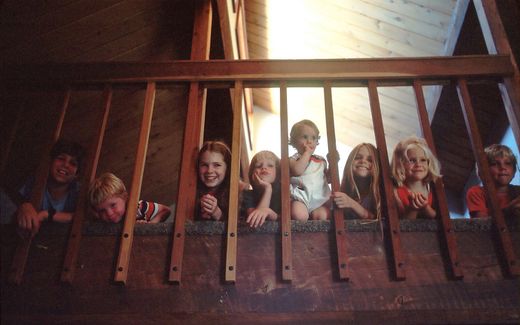Eastern Block sees more value in large families than Western Europe

A family with four children eating lunch in the back of their van. Photo iStock
European Union
One, two, three, four. Anyone who comes from a large family knows the experience that bystanders count the children whenever they get out of the minivan at the supermarket. Welfare systems in Western Europe are less favourable to large families than in Central and Eastern Europe. Question is what future large families have in Europe.
With three children, your family is considered to be large in Spain. Officially. That means that you get discounts in public transportation or more financial support when your children go to university, thanks to what is known as a large family card that provides discounts for families with at least three children. However, the Spanish government has new plans.
Instead of only supporting families with three or more children, the Spanish government wants to extend benefits of the large family card to more types of families that may need support, such as families of which one parent is disabled, and one-parent families, regardless of the number of children. That means that the requirement of having three or more children to get the support is not as absolute anymore.

Family organisations are indignant about the change. Even though the government withdrew its decision to change the name of the Law for the Protection of Large Families into “Law for the Protection of Families with Greater Needs for Parenting Support”, pro-family organisations are afraid that the government downplays the importance of large families, by abolishing the large family card.
Problems
The European Large Families Confederation (ELFAC) worries about the planned changes of the Spanish government. The problem is that the authorities equate large families with families that have problems, says Regina Maroncelli in an interview with CNE.news. Maroncelli is the president of the Confederation, a European-wide organisation that represents the interests of large families on the continent. She is concerned that the new law will not be based on the number of children, but on the number of problems a family has. “Large families are not families that are in need”, she stresses. “They are not per se economically or socially excluded, like single-parent families, for example, are.”
Instead, large families are a value to society that must be protected, Maroncelli, a mother of four herself, argues. “We don't need to be saved from poverty. But we need to be supported and compensated for the extra expenses that are unavoidable with more children. Therefore, we should not talk about large families as vulnerable, but as a lifestyle.”
Standard
What is the status of large families in other countries? Overall, European countries define large families as households with three or more children. In some countries, the standard is a bit higher, such as in Greece, where a family needs to have four children to be considered large.
Almost all countries in Europe have some form of child benefits, says Raul Sanchez, the General Secretary of the European Large Families Confederation. Even when large families do not have a legal status or are not mentioned in the law, they benefit from these regulations. Oftentimes, the child allowances increase in amount if a family has more children. In other words, parents receive more money per month for their fourth child than for their firstborn. Belgium is an example of this.
Large family card
There are a few countries in which large families are officially mentioned in the law and have therefore a special legal status. Among them are Spain, Poland, Hungary, the Baltic countries, Russia, and Italy.
Several countries in Europe offer a large family card that gives large families discounts on, for example, public transportation tickets, restaurants, and hotels. This applies to at least France, Czech Republic, Greece, Spain, Estonia, Hungary, Poland, Lithuania, Latvia, Croatia and Germany.
Romania does not have a national large family card, but some local regions did implement one. The same applies to Russia. In Hungary, a large family card is available via the National Association for Large Families. Hungary's public transportation has been free for large families since this March.
The benefits attached to the large family card differ per country. Spain goes as far as offering large families discounts on university fees, but not all countries do so.
Several other countries are considering the implementation of a large family card to support families with more children than average. Among them are Romania and Italy. Romania is in the process of adopting a definition of large families for in the law. In Italy, these types of families are already mentioned in the law, but no consequent policies are implemented in the country. However, Sanchez is hopeful. He met the Family Minister of Italy, and she told him that she wants to implement a large family card.
Discounts
Some countries, among them Spain, have reduced prices for basic supplies for large families, a survey of the Large Families Confederation shows. Romania, Italy, Latvia, Greece and Hungary also offer families with many children discounts on water, energy etc. In Italy, diapers and other supplies for young children enjoy tax discounts. The same applies to Croatia.
Sometimes, large families benefit from longer maternity or paternity leave after the birth of a child. This is the case, for example in Croatia, where mothers of three or more children get a maternity leave of three years. In Hungary, large families benefit from a parental leave regulation that both parents have the right to claim extra paid leave based on the number of children they have. If they have three or more kids, they can claim six days extra.
In Spain, large families with a low-income benefit from direct monetary allowances. They get 1000 euros for the birth of a child. In Romania, there are special allowances for heating, among others, for which large families are eligible. Other countries have child allowances that are higher when a family has more children. One example is Estonia. There, families with three to six children get 450 euros per month, while families larger than 7 receive 650. For the first and second child, families only receive 80 euros per month.

In Poland, every child receives 800 zlotys (about 200 euros) per month, says Sanchez from the European Large Families Confederation. For any children after the third, they receive even more, he adds. In Portugal, the rules are a bit stricter. Families only get a higher child allowance as long as they have at least two children under 3 years old. Lithuania also knows a higher child allowance for families with more than three children, and the same applies to Germany, where the benefits become higher as the family grows.
Some countries help large families with buying a larger car if necessary. In Spain and Greece, there is a special fiscal deduction. The same applies to Portugal. In Latvia, there is no monetary support for buying a vehicle, but large families that have two cars enjoy a lower road tax. Hungary used to have support measures for large families buying a car, but these were discontinued in 2022, a survey by the European Large Families Confederation shows.
There are also countries in which large families pay lower amounts of taxes than other households. France is a good example of this, Sanchez says. The tax system there calculates the due amount of taxes based on the number of people in a household. As a result, large families do not have to pay as much as smaller households. Also in countries, such as Spain, Croatia, Hungary, Poland, Czechia, Portugal, Latvia, and Germany, large families benefit from tax reductions. In Greece, families get more reductions if they have more children. For example, for the first child, they get a discount of 900 euros, for the second, 1120 euros etc.
Plot of land
Russia also has several regulations that are beneficial to large families. Depending on the region, families with three or more children receive advantages. For example, Nomad families in the north of Russia are granted a new tent with a worth of about 5000 euros. It even includes a stove. In the region of Moscow, some families with large children are even eligible for receiving a plot of land. And in Moscow, they have free public transport.
Last January, President Putin signed a decree that makes it possible to register all large families (with three or more children) into a large databank, Tadvisor writes. With the decree, large families in Russia received an enshrined status in the law. According to the Ministry of Labour, large families are guaranteed “the provision of state benefits and payments in connection with the birth and upbringing of children”. In addition, parents of large families have the right to receive additional vocational education and mothers of large families can get access to early appointment of an insurance pension. Also, large families can visit museums, parks and other cultural destinations for free.
Trends
When asked which country is most family friendly, Regina Maroncelli from ELFAC does not hesitate: “Hungary”. She praises the country for explicitly welcoming families with children. “When you arrive in Hungary, you will see large pictures of families”, Maroncelli illustrates. “The general idea in society seems to be that they want you to have children and they need to have children.”
She sees a large difference between non-Western and Western European countries when it comes to family policies. Whereas Western countries, such as Spain, seem to be removing their special support for large families, countries in Eastern Europe do the opposite.
According to Maroncelli, Western societies want to be inclusive and worry that it is not right that big families get more benefits than other types of families, she says. In Eastern Europe, this is not so much a worry, but there, other concerns are shaping the family policies. “Especially in Eastern Europe, the demographic problems are bad”, Maroncelli explains. Small countries like Latvia and Hungary do not have a large population, and low birth rates will inevitably lead to shrink since the immigration is limited too. In addition, some of these countries have historically many people from Russia. “Without having children to replenish their own population, these countries have a fear of losing their national identity in the near future. Therefore, they see a great need to stimulate their population to get more children.”
As a result of these differences in mentality between East and West, Western countries pay more attention to giving single-parent families and rainbow families the same status as the traditional family, while Eastern European countries put more emphasis on growing their population and increasing their birth rate.
Raul Sanchez, general secretary of ELFAC, sees the communistic past of many Eastern European countries as a reason why these nations are more likely to invest in large families. “During the Communist era, family was the only place where people were free and where they were seen as human beings. Therefore, Eastern Europeans know that family saves us sometimes, as it did under the pressure of Communism”, he says. According to the general secretary of ELFAC, these people know the disastrous consequences of breaking family links. “They see how individualism conquers Western Europe more and more, and want to prevent this from happening in their own countries.”
Western countries, on the other hand, see the problem of the “demographic winter” that decreases their population, Sanchez says. However, laws to protect large families often are lacking. He suspects that this contradiction is to blame on the negative views that are held about large families in Western Europe. “The idea is that large families are ultra-conservative", he says. Often, the general secretary notices that people associate families with many children to Nazi and fascist policies that aimed to produce more children. And this view is unjustified, he points out. “We are not defending policies that force people to have children. We only want to create conditions so that people who want to have children can have them and do not experience any obstacles.”
However, Sanchez is hopeful, also for Western Europe. He expects that the tide will be turned. The President of the European Commission, Ursula von der Leyen (herself a mother of seven), already appointed a vice president for demography and democracy, he points out. And after the next election, Sanchez expects the appointment of a commissioner for family policies to coordinate family laws in Europe. “We need harmonisation to put the family more and more in the centre of policies. If we don't have children, we won't have a Europe.”
What policies do large families want?
Regina Maroncelli from the European Large Family Confederation has several recommendations for countries that want to support large families. First of all, they should explicitly show that they value children, she says. “The fact is that large families are still suffering of social stigma, and that should be removed.”
In Italy, where she lives, she experiences that people draw a line between large families and the Fascist regime which prided itself in traditional values and family policies. And as a result, large families are still viewed negatively.
In addition, families should have the right to decide on the number of children they want without having to worry about the implications of their choice, Maroncelli believes. “They should be supported according to the number of children. It is not fair that a single person pays the same amount of taxes as a father who has to share his wage with his wife and children.”
Thirdly, Maroncelli pleads for what she calls wellbeing policies that contribute to the wellbeing of large families. “More playgrounds, safer cycle paths, more places where parents can change the nappy of their children, more parking places for bigger cars”, she sums up.
Lastly, large families should have better access to insurances, as they are more vulnerable. Florio mentions the example of a family with six children. Suddenly, the father passed away unexpectedly at the age of 43. With that, the family lost its main provider and ended up in poverty quickly. “Life insurances are expensive”, Maroncelli says. “Large families already have many expenses, and they may not be able to pay for this. Therefore, it would be nice to make insurances a bit cheaper. After all, you can never plan your life perfectly. If that would be the case, many large families would not have existed.”
Related Articles














